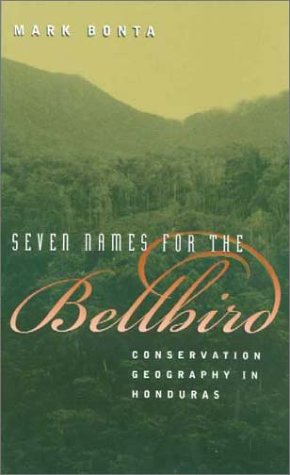July 8, 2004: Headlines: COS - Honduras: Writing - Hondruas: Environment: Geography: Protected Areas Movement: Travel to Southern America: Honduras RPCV Mark Bonta's book wonderfully captures the "ornithophilia" of Olanchanos, and puts together a stong case for conservation at local scales that build upon existing needs and environmental concerns
Peace Corps Online:
Directory:
Honduras:
Peace Corps Honduras:
The Peace Corps in Honduras:
July 8, 2004: Headlines: COS - Honduras: Writing - Hondruas: Environment: Geography: Protected Areas Movement: Travel to Southern America: Honduras RPCV Mark Bonta's book wonderfully captures the "ornithophilia" of Olanchanos, and puts together a stong case for conservation at local scales that build upon existing needs and environmental concerns
Honduras RPCV Mark Bonta's book wonderfully captures the "ornithophilia" of Olanchanos, and puts together a stong case for conservation at local scales that build upon existing needs and environmental concerns

Honduras RPCV Mark Bonta's book wonderfully captures the "ornithophilia" of Olanchanos, and puts together a stong case for conservation at local scales that build upon existing needs and environmental concerns
I too was a Peace Corps volunteer (99-01) working in Sierra de Agalta National Park and its surrounding communities. Mark's book wonderfully captures the "ornithophilia" of Olanchanos, and puts together a stong case for conservation at local scales that build upon existing needs and environmental concerns. A must have for all conservationists working in Honduras or anywhere else for that matter.
Seven Names for the Bellbird goes beyond typical discussions of environmental problems in Latin America to show how real people and real birds interact in their shared landscapes. The wealth of details in Bonta's discussion makes a significant contribution to the study of human-animal interactions. Easily accessible and yet provocative, Bonta shows how conservation activities need to be based on local practices and control of resources--a lesson not just for environmentalists working in developing countries, but good advice for people working to protect their own neighborhoods.

Some postings on Peace Corps Online are provided to the individual members of this group without permission of the copyright owner for the non-profit purposes of criticism, comment, education, scholarship, and research under the "Fair Use" provisions of U.S. Government copyright laws and they may not be distributed further without permission of the copyright owner. Peace Corps Online does not vouch for the accuracy of the content of the postings, which is the sole responsibility of the copyright holder.
Story Source: Travel to Southern America
This story has been posted in the following forums: : Headlines; COS - Honduras; Writing - Hondruas; Environment; Geography; Protected Areas Movement
PCOL12308
08
.

